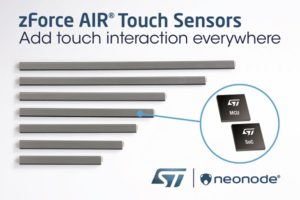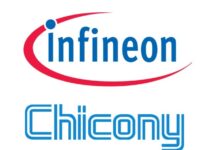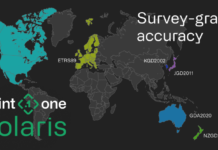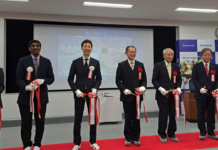
State-of-the-art silicon chips from STMicroelectronics , a global semiconductor leader serving customers across the spectrum of electronics applications, have enabled new zForce AIR™ touch-sensing modules from Neonode , the optical sensor technology company.
Neonode’s compact, low-power, and easy-to-use modules add touch interaction to any USB- or I2C-connected object and work with any type of display or surface, including steel, wood, plastic, glass, skin, or even nothing, able to detect touch interactions in mid-air. The innovative approach uses laser-generated infrared light to track touch or gesture control, combining millimeter precision with ultra-fast response. The non-visible-spectrum light doesn’t impact display quality, add glare, or shift colors.
The new Neonode family of touch-sensors uses a programmable mixed-signal custom System-on-Chip (SoC) and an STM32 Arm Cortex microcontroller from ST for scanning laser diodes and IR beams to determine the exact position and movements of fingers, hands, or other reflective objects in the light path. Multiple objects can be tracked simultaneously and interpreted as touches or gestures with extreme accuracy: the coordinates are relayed up to 500 times per second with virtually zero delay.
“ST’s leading-edge chip-design capabilities and manufacturing processes have enabled us to build an innovative, high-performance optical-sensor system that is highly complex yet cost-competitive,” said Andreas Bunge, CEO of Neonode. “The advanced mixed-signal SoC and STM32 microcontroller at the heart of our new zForce AIR modules deliver the right combination of touch-control precision in real-time, low power consumption, and configurability.”
“This innovative sensing technology can make any object, surface, or space touch- interactive, bringing complete freedom of design,” said Iain Currie, Vice President North Europe Sales, STMicroelectronics. “Neonode’s decision to use ST technologies confirms our enabling role in the development of advanced applications that break new ground in man-machine interaction.”
Further information can be found at www.st.com



















